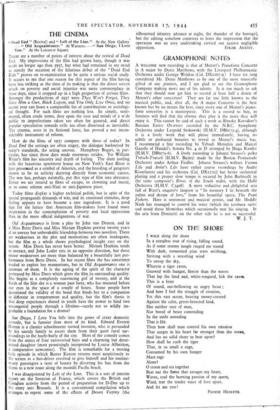THE CINEMA
Dead End " (Revival) and " Left of the Line." At the New Gallery —" Old Acquaintance." At Warners.—" San Diego, I Love You." At the Leicester Square.
THERE are a number of points of interest about the revival of Dead End. My impressions of the film had grown hazy, though it was made no longer ago than 1937, but what 114c1 remained in my mind as merely the occasion of the hilarious debut of the " Dead End Kids" proves on re-examination to be quite a serious social study. It occurs to me that one reason for this aspect of the film having been less striking at the time of its making is that the direct screen attack on poverty and social injustice was more commonplace in those days, since it cropped up in a high proportion of serious films. Amongst the productions of 1937 were They Won't Forget, They Gave Him a Gun, Black Legion, and You Only Live Once, and no recent year can boast a comparable list of contributions to sociologi- cal thought. For such films are nothing less. In simple, senti- mental, often crude terms, they open the eyes and minds of a wde public to .imperfections taken too often for granted, and direct popular speculation towards evils too often dismissed as inevitable. The cinema, even in its fictional force, has proved a not incon- siderable instrument of reform.
How do the films of 1937 compare with those of today? In Dead End the settings are often stagey, the dialogue hackneyed by today's standards, the acting uneven. Humphrey Bogart, in par- ticular, has since those days made enormous strides. Yet William Wyler's film has sincerity and depth of feeling. The slum jostling with the luxurious apartment house on New York's East River is here presented as a symbol of Ainerica and the breeding-of gangsters shown to be an activity deriving drectly from economic causes. The war has, perhaps naturally, put this type of film into abeyance. Either we are treated to films of escape, to clowning and music, or to some solemn anti-Nazi or anti-Japanese piece.
Today films display a higher technical polish, but in spite of the special propaganda demands of wit., and its emotional.stimulus, deep feeling appears to have become a rare ingredient. It is a good sign for the future that American film-makers have found more inspiration in the contemplation of poverty and local oppression than in the more official indignations of war.
Old Acquaintance is from a play by John van Druten, and in it Miss Bette Davis and Miss Miriam Hopkins portray twenty years of an uneasy but unbreakable friendship between two novelists. There are weaknesses in the plot and motivations are often inadequate, but the film as a whole shows psychological insight rare on the screen. Miss Davis has never been better. Miriam Hopkins tends to overact, and John Loder errs in an opposite direction, but these minor weaknesses are more than balanced by a beautifully just per- formance from Bette Davis: In her recent films she has sometimes tended to exploit her mannerisms, but in Old Acquaintance one is unaware 4 them. It is the ageing of the spirit of the character portrayed by Miss Davis which gives the film, its outstanding quality. She begins as a completely convincing girl of twenty, and at the finish of the film she is a woman past forty, who has matured before our eyes in the space of a couple of hours. Some people have questioned the validity of the bond that binds her to a companion SO different in temperament and quality, but the film's thesis is that deep experiences shared in youth have the power to bind two uncongenial people through a lifetime—surely not so wildly im- probable a foundation for a drama?
San Diego, I Love You falls into the genre of crazy domestic comedy, but is funnier than most of its kind. Edward Everett Horton is a classics schoolmaster turned inventor, who is persuaded by his unruly family to escort them from their quiet rural sur- roundings to the hurly-burly of the city. Most of the comedy comes from the antics of four extroverted boys and a charming but deter- mined daughter (most promisingly interpreted by Louise Allbritton, a comparative newcomer). The film is remarkable for a moving little episode in which Buster Keaton returns most auspiciously to the screen as a bus-driver resolved to give himself and his routine- weary passengers a taste of beauty by diverting his bus from the slums to a new route along the moonlit Pacific beach.
I was disappointed by Left of the Line. This is a sort of interim report on the Invasion of France, which covers the British and Canadian activity from the period of preparation for D-Day up to the entry into Brussels. It is a conventional compilation which attempts to repeat some of the effects of Desert Victory (the
silhouetted infantry advance at night, the thunder of the barrage), but the editing somehow contrives to leave the impression that the operation was an easy undertaking carried out against negligible


























 Previous page
Previous page